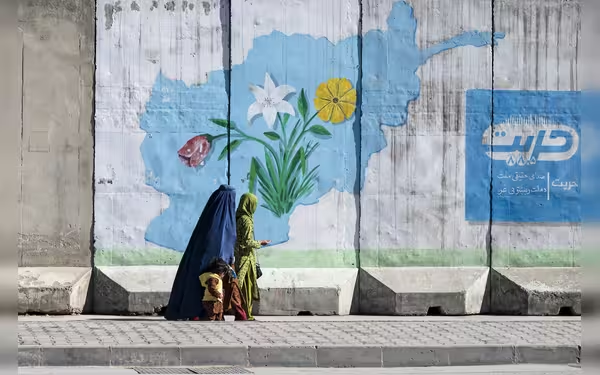Saturday, November 16, 2024 05:57 PM
Afghan Women’s Rights Under Siege Amid Taliban Rule
- Taliban imposes new law silencing Afghan women.
- International discussions overlook voices of Afghan women.
- Activists demand representation in human rights forums.
 Image Credits: arabnewspk
Image Credits: arabnewspkAfghan women face increasing oppression under Taliban rule, with their voices silenced and ignored in international discussions.
The situation for women in Afghanistan has become increasingly dire since the Taliban regained control of the country in 2021. With the withdrawal of US-led forces after two decades of conflict, the Taliban has imposed strict laws that not only limit women's rights but also silence their voices. Recently, a new law was introduced that prohibits women from raising their voices in public, further marginalizing them in a society that has already seen significant restrictions on their freedoms.
According to reports, the Ministry of Propagation of Virtue and Prevention of Vice has mandated that women must cover themselves completely, including their faces, and now they are also expected to conceal their voices. This move has been described by activists as a step towards erasing women's roles in society. Haida Akbari, a prominent women's rights activist in Kabul, expressed her concerns, stating, "The government has practically ignored the voice of women and is seeking to eliminate as much of the role of women in society as possible."
Since the Taliban's takeover, Afghan women have faced numerous restrictions. They have been barred from attending secondary schools and universities, participating in most forms of paid employment, and accessing public spaces like parks and gyms. Each of these limitations has drawn international condemnation, yet the voices of those directly affected are often overlooked in discussions held abroad.
In recent media discussions regarding the new law, many international outlets have sought comments from former Afghan officials living in exile, rather than from women currently living in Afghanistan. This has raised concerns among activists like Akbari, who argue that the experiences of women living under Taliban rule are vastly different from those who have fled the country. "There is no doubt that a woman living inside Afghanistan who wants to continue her life inside the country is very different from someone who is outside the country," she noted.
Adina Ranjber, the director of a women-led organization called OTUF, emphasized the importance of giving Afghan women a platform in international forums. She stated, "Women’s views and demands in the country are often ignored and suppressed. It seems that there is still a long way to go for Afghan women’s views to be heard and considered." Ranjber believes that representation in human rights discussions is crucial for promoting gender equality and creating a more just society.
Moreover, Ranjber pointed out that the silence of Islamic countries and Muslim scholars regarding the plight of Afghan women contributes to their marginalization. This silence allows Western media to overlook the voices of Afghan women, compounding the issue rather than addressing it. As the world watches, it is essential to remember that the struggles of Afghan women are not just a distant issue; they are a pressing human rights concern that requires immediate attention and action.
The voices of Afghan women must not be silenced, whether at home or abroad. It is vital for the international community to listen to their experiences and advocate for their rights. Only by amplifying their voices can we hope to foster a society where women are respected, valued, and empowered to participate fully in all aspects of life. The fight for women's rights in Afghanistan is far from over, and it is a collective responsibility to ensure that these voices are heard and acknowledged.













